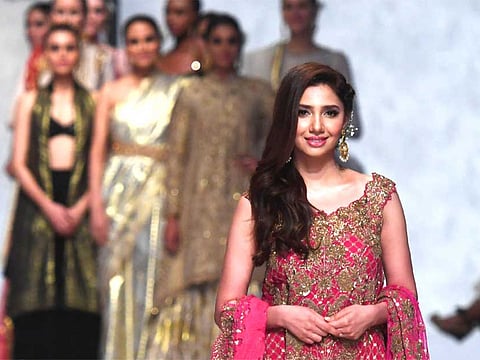Mahira Khan says Pakistan is poised for change
Actress explains why the release of ‘Verna’, her film about a rape survivor who takes revenge on her attackers, was a victory for all women

Mahira Khan represents a face of Pakistan rarely seen outside the country. An unapologetic rebel in her life choices, she represents a new generation — and is helping redefine what it is to be a Pakistani woman.
The 33-year-old came to the attention of the world in a whirl of controversy when her film, Verna (Or Else), about a rape survivor who wreaks revenge on her attackers, was denied a certificate by the Central Board of Film Censors (CBFC) in Pakistan because of its “mature themes” and “edgy content”.
The ruling attracted global condemnation and the film won the backing of the international film fraternity, including the Oscar-winning director Sharmeen Obaid-Chinoy and the Bollywood actor Deepika Padukone (who had faced a similar backlash for her film Padmaavat).
‘Bol’ (2011).
The ban was lifted hours before Verna was due to be released, and the film proved to be a bold condemnation of the way Pakistani society victimises women.
“I was nervous about how it would work as a film as well as the performance,” says Khan. “But about the subject matter? Never, because I stand by it. There were certain aspects of the story that people did not agree with, but not about the core message of the film.
“What we have to bear in mind is that, yes, Verna was going to get banned because of the decision of a small minority, but [it] did not get banned because of the majority who stood up for the film. To me, that is a victory.”
‘Raees’ (2017).
The release of Verna coincided with the #MeToo campaign, but also came at a time when there was a growing anger across the subcontinent about rape and sexual abuse. Not long after the film was released, the country was rocked by the case of Zainab Ansari, the seven-year-old girl who was brutally raped and murdered, sparking violent protests.
“It was a breaking point for society,” says Khan. “The whole nation came out on to the streets. Everyone was angry and wanted justice. There is not enough education, and we are still shaming victims and talking about the issue in terms of family honour. Pakistan is ready for change.”
Post Verna, it was perhaps inevitable that Khan should be perceived as a role model in the #MeToo movement in Pakistan.
‘Verna’ (2017).
“Work-wise, since I started in the industry, I have never experienced any harassment or abuse,” she says. “Like every woman, I do have a #MeToo story; but if somebody wants to share something personal, they should do it when they want to, not because there is a movement or someone else is talking about it.”
She credits her independent stance to her upbringing in an extended family in Karachi.
“My parents were like these hippies almost, they are free-spirited, but they were also strict — which seems like a weird dynamic — but it worked. They allowed us to do what ever we wanted as long as we understood we were responsible for our choices and understood the consequences.”
Like many middle-class Pakistani women, she spent a couple of years studying in the west, in her case in the US, which she describes as a pivotal experience in her life.
“I lived the life that a lot of American kids do, away from home at 17, working two jobs. Your perception of things changes. I came from a very safe, closeted environment, like a bubble. Here I was, exposed to people from all walks of life; it made me a more tolerant person.”
Khan began her career as a TV presenter on MTV Pakistan before making her film debut in the 2011 release Bol (Speak), about a woman facing the death penalty. Bol was directed by Shoaib Mansoor, a key figure in the recent resurgence of Pakistani cinema.
“His films are considered [to mark] the revival of the film industry because it had been such a long time since films had come out that had been made in Pakistan. They bought audiences back to the cinema, appealed to both the masses and the middle-classes and made waves internationally.”
Her TV work drew Bollywood’s attention, and Khan was cast in the 2017 Shah Rukh Khan action blockbuster, Raees.
But, just as Raees was about to be released, the Indian Motion Picture Producers Association imposed a ban on Pakistani actors and technicians in retaliation for an attack by militants in Kashmir. Pakistan retaliated by banning Raees.
“Professionally, it didn’t matter,” says Khan, “but on a personal level it was hurtful. It became a big thing because of the timing and because it was such a big film. People were waiting for it in Pakistan and were looking forward to seeing one of their own in a big film. I believe if it had run there, it would have been the biggest hit Pakistan has ever seen. I hope it will be shown there one day.”
This was followed up by pictures of her caught smoking with Bollywood actor Ranbir Kapoor, which went viral, prompting Khan to come out and describe feeling “violated” by the backlash.
As a divorced single mother, Khan describes herself as “an anomaly in Pakistan”, and hopes to break the glass ceiling for other women. “I feel that I don’t just represent me, I represent every woman in Pakistan.”
Sign up for the Daily Briefing
Get the latest news and updates straight to your inbox



